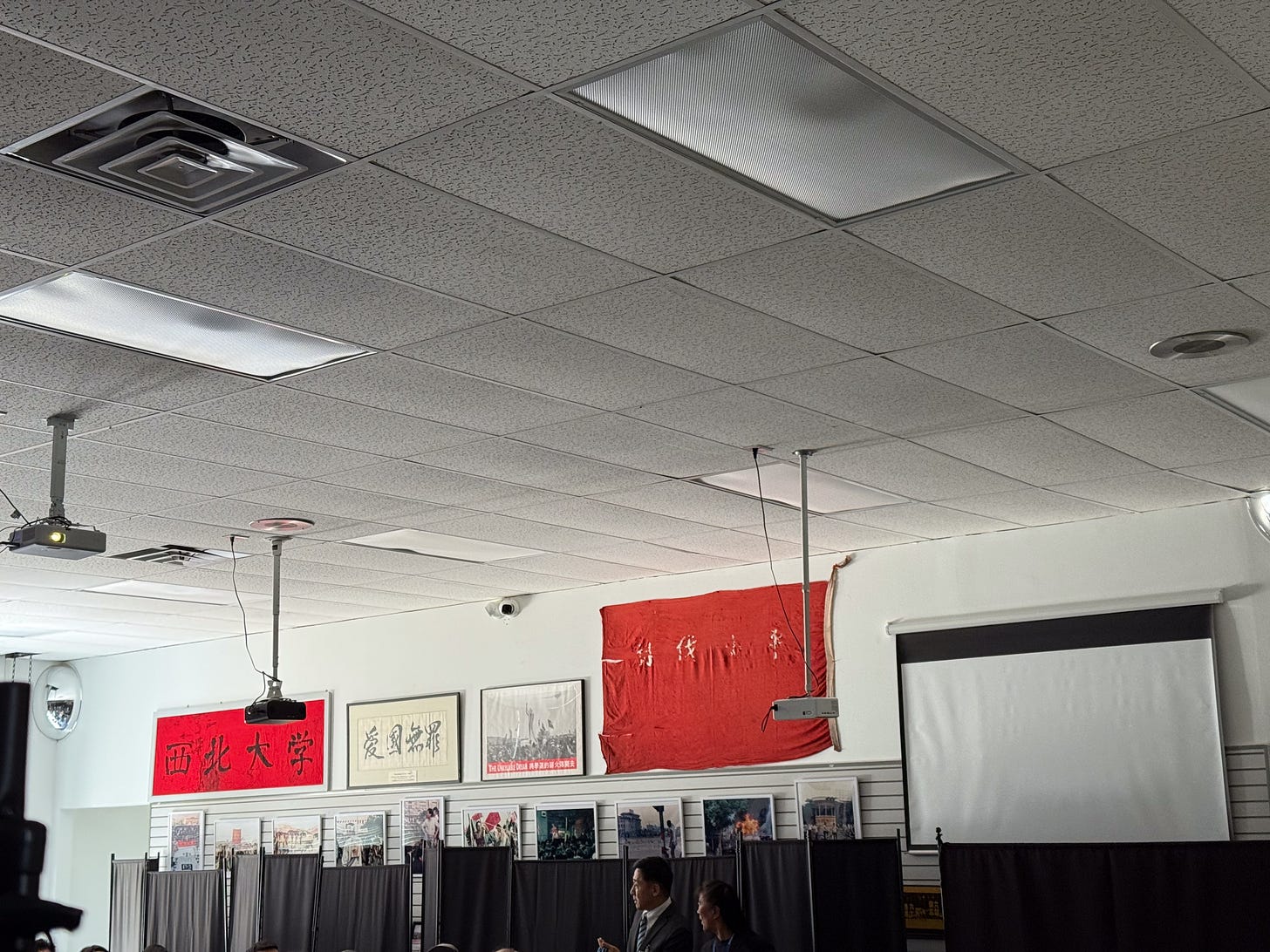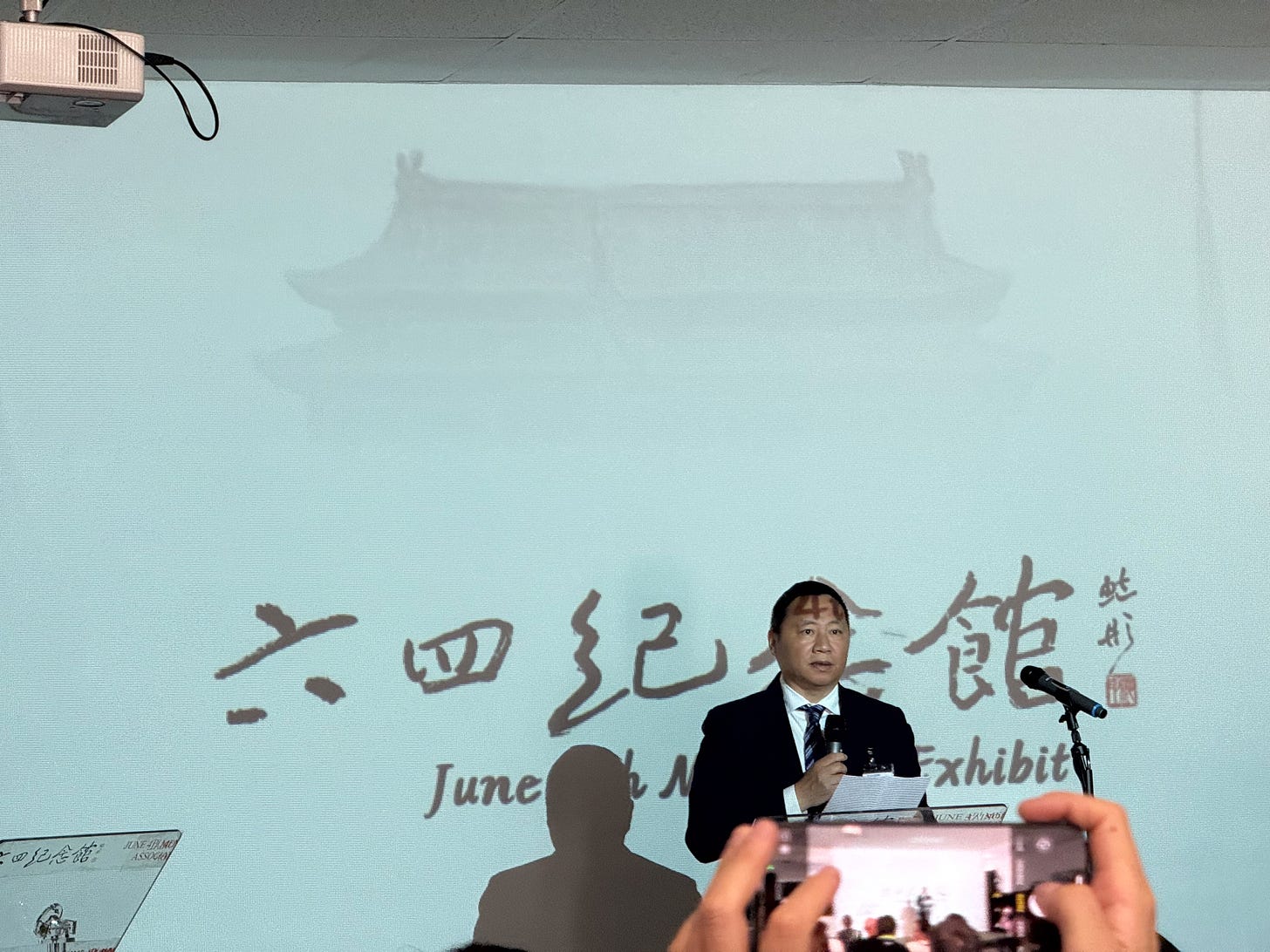Heavenly Peace Comes to the City of Angels
June 4th Memorials and the State of the Overseas Chinese Democracy Movement
The Monitor and China Focus receive a fair amount of articles from outside contributors given how little time I have to solicit them. Only twice in the last year have I been asked to publish something anonymously. The article below is one of those times.
I was trained as a historian of Cold War Asia. I’m very quick on the draw with criticisms of the absolute and monstrous brutality of U.S. foreign policy. Yet, a feature of the liberalism in the United States that accompanied such monstrousness was the freedom to call it out. I’ve long joked that freedom of speech in the United States was false because when anyone is free to say anything speech doesn’t actually matter (well, half joked). This is the same freedom that generated vaccine and election conspiracies afterall. In China, I would then say, speech really matters because it isn’t free.
The requests I’ve received to publish anonymously for The Carter Center have both been in 2025 and are over concerns about repercussions on both sides of the Pacific. To take my joke seriously may mean I need to stop telling it. We’ve already entered a period where basic liberal rights are conditional. They’ve lost their universal guarantee, which is to say they’ve been lost full stop.
It is a good time to remember Tiananmen globally. With authoritarianism on the rise and no organized response in site, the story of Tiananmen need not be some ritualized tattling on what America’s enemy did to its own people, which is what I think it has been for the right. Tiananmen is not China’s Tiananmen. It is everyone’s Tiananmen. Or, that’s what I think the best rememberance of it should be.
Now, on to the opening of the new June 4th Memorial in Los Angeles by Anonymous.
Thanks,
Nick
Heavenly Peace Comes to the City of Angels
On June 2 this year, 36 years after the Tiananmen Square massacre, the June 4th memorial in Los Angeles opened its doors, completing its second relocation since 2021.
Originally established in Hong Kong by the Hong Kong Alliance in Support of Patriotic Democratic Movements of China (‘The Alliance’), the memorial exhibits original materials from the 1989 student movements in Beijing, including flags, placards, photos, and videos from Tiananmen Square. For many years, Hong Kong was home to the annual Victoria Park rallies commemorating the events in June 1989 and a variety of other civil society initiatives centered around preserving memories of the Tiananmen Square massacre. After the passage of the National Security Law in mid-2020, however, the Alliance was disbanded, rallies commemorating June 4th were banned, and the museum was forced to shut down, keeping only an online virtual exhibit.
Following the closing of the memorial in Hong Kong, Wang Dan, a prominent student leader in 1989 who now resides in the United States, spearheaded the creation of a new exhibit in New York City. After temporary exhibitions in Washington D.C. and fundraising efforts, Wang served as the director of the Memorial, which opened in Manhattan on June 2, 2023. However, due to challenges in fundraising and the high cost of rent in midtown Manhattan, the Memorial’s directors decided to relocate it to Los Angeles in mid-2024.
The opening event was attended by a variety of high-profile Overseas Chinese Democracy Movement (OCDM) activists and dissidents, as well as academics and government and nonprofit officials. In his speech, Wang Dan said that he hopes to see the Memorial become a space of active engagement for local Chinese communities in the area and Americans who support the cause for democracy in China. Wang envisions the museum to serve as a communicative space which connects the memories of June 4th to other contemporary social movements, including those in Hong Kong, Tibet, and the Uyghur Region. The Memorial site in Los Angeles features a room dedicated to social movements in Hong Kong from 2014 to the present, highlighting the interconnectedness between Chinese and Hong Kong social movement aspirations and challenges.
Perry Link, a Harvard-trained sinologist who helped activists leave China following the 1989 movement, emphasized that while the June 4th massacre created a culture of fear and pessimism in the pro-democracy movement in China, it was preceded by an optimistic student movement with wide mobilization and democratic ideals. He expressed hopes that the Memorial will serve as a space of education and mobilization for younger generations from China who did not live through the social movements of 1989.
While the challenges of sustaining a social movement across decades are apparent, as in the case of the OCDM, many speakers who were student leaders in 1989 remained hopeful that they will be able to see their aspirations come to fruition within their lifetimes. Zhang Boli, a 1989 student leader who now serves as a pastor in Washington D.C., remarked that the Memorial’s Los Angeles location would only be the third of four June 4th memorials—with the hope that the fourth and final one would be at Tiananmen Square itself when China democratizes.
The political messaging of most speakers in the opening event mirrored the longstanding advocacies of the OCDM from the 1989-generation: ending the one-party rule of the Communist Party and the introduction of liberal democratic politics in China. It is not surprising that most participants at the event were from the same generation, for whom the defining political event of their lifetimes was the 1989 movement and the subsequent massacre at Tiananmen Square. Most of them have been in exile since then. For the younger generation of Chinese political activists, however, the defining political event was the COVID-19 pandemic, with the government’s enforcement of often-arbitrary COVID policies and the eruption of the White Paper movement by the end of 2022.
As the OCDM is a broad coalition with the basic political position of being against the status quo society and politics in China, it faces challenges when processing conflicting political positions on host country politics, particularly in the United States. Many 1989-generation dissidents, including Wang Dan, have publicly defended President Trump and the Republican Party when it comes to domestic and foreign policy, possibly with the hope that they will take a more aggressive posture against the Chinese Communist Party. This rationale is highly contested within the community, as many younger activists see common threads of political repression and institutionalized violence between China and the United States. Compared to the 1989-generation of activists, younger (progressive) activists tend to embrace a platform with more diverse political advocacies, including feminist, queer, and ethnic minority liberation. Commemorating June 4th is one of the few symbolic acts which continues to unite Chinese activists across generations and the political spectrum; despite this, tensions remain palpable, particularly when speakers address their positive political platforms such as regime change.
The Memorial, in its aspirations of becoming a space for cultural and political exchange, joins many existing Chinese diasporic organizations and bookstores, ranging from JF Books in Washington D.C., which hosts regular book talks and seminars on Chinese issues, to Starshiner, a sinophone activist group in the San Francisco Bay Area which organizes discussions, film screenings, and political gatherings. While the next generation of the OCDM may not follow the political strategy of the 1989-generation, which has primarily focused on lobbying Western governments—spaces like the June 4th Memorial are valuable additions to the cultural landscapes for Chinese communities abroad that seek to bridge between generations, preserve critical memories, and sustain future engagement.
The views expressed in this article represent those of the author(s) and not those of The Carter Center.
Peace is always on the back foot. To promote peaceful cooperation between the United States and China, all content from the Monitor is provided here for free. If you would like to contribute to our work, please feel free to make a donation to The Carter Center. Please indicate your donation is for China Focus.
That’s all from Atlanta. Y’all be good.









